|
|
|
Sort Order |
|
|
|
Items / Page
|
|
|
|
|
|
|
| Srl | Item |
| 1 |
ID:
126993


|
|
|
|
|
| Publication |
2013.
|
| Summary/Abstract |
For the Geopolitics Lecture at the Association of American Geographers Annual Meeting 2010, the paper examines the core features of Mackinder's geopolitical imaginary, reviews contemporary challenges to those elements and develops an alternative conception of space for a Progressive Geopolitics.
|
|
|
|
|
|
|
|
|
|
|
|
|
|
|
|
| 2 |
ID:
152551
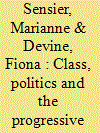

|
|
|
|
|
| Summary/Abstract |
This article considers contemporary class inequalities and how they might shape a progressive politics in the UK. Drawing on findings from the BBC Class Survey, it outlines changes in the class structure, class mobility and class identities. It is argued that the class structure is increasingly polarised and fragmented, with a wealthy elite, a vulnerable precariat and fragmented middle and working classes in between. Declining upward social mobility is a source of anxiety for middle-class and working-class parents alike. Class identification, especially working-class identification, has weakened over time, although class snobbery is far from dead. Class has changed and the class basis of politics is changing now too. A progressive politics is possible if the political parties of the centre-left appeal to the majority of the electorate rather than one class, acknowledge common concerns and worries and appeal to shared hopes and dreams that straddle class boundaries.
|
|
|
|
|
|
|
|
|
|
|
|
|
|
|
|
| 3 |
ID:
121599
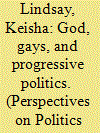

|
|
|
|
|
| Publication |
2013.
|
| Summary/Abstract |
I draw on conservative black Christians' claims regarding their co-constitutive racial, religious, class, and sexual subordination to demonstrate that intersectionality is a heuristic that can be used to advance a range of normative arguments. My research rejects traditional understandings of intersectionality as a necessarily progressive analytical framework, as well as recent discussions that suggest that intersectionality's use for conservative ends is evidence of its theoretical underdevelopment. My analysis also reveals that by positing interlocking racism, classism, heterophobia, and anti-Christian bigotry as blacks' "true" experience of oppression, conservative black Christians guide political scientists to consider 1) that intersectional analysis is central rather than antithetical to in-group policing; 2) that we can best interrogate the standards that social groups use to police their boundaries when we adopt a normative-critical conception of power, and 3) that power so defined challenges the erroneous assumption that our role is to either describe or prescribe social reality.
|
|
|
|
|
|
|
|
|
|
|
|
|
|
|
|
| 4 |
ID:
112498
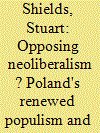

|
|
|
|
|
| Publication |
2012.
|
| Summary/Abstract |
This article interrogates the social impact of neoliberalisation and the counter-hegemonic forces this has engendered by exploring Poland's recent populist turn. It rejects methodologically nationalist attempts to isolate events in Poland from wider processes of structural change and the accompanying realignment within the global capitalist economy, analysing the implications of a number of alternative and counter-hegemonic projects to the neoliberal mainstream. The article considers whether the populist turn signals a decisive rejection of neoliberalism, despite the absence of a coherent left alternative and the fact that the anti-neoliberal alternative has come from the nationalist right, dominated by politically regressive conservative social forces who have aimed to arrest welfare cuts and end the austerity associated with Poland's seemingly endless forms of reform. While no clear anti-neoliberal strategy exists, pragmatic responses have occurred but within the structurally delimited environs of state intervention. Utilising a Gramscian critical political economy the article shows how populist counter-hegemonic forces have been co-opted and are best understood in terms of the relationship to specific conjunctural projects for the reorientation of the reproduction of capitalist social relations. The conclusion reflects on the potential for a progressive politics of a renewed Polish left to emerge.
|
|
|
|
|
|
|
|
|
|
|
|
|
|
|
|
| 5 |
ID:
172401
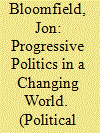

|
|
|
|
|
| Summary/Abstract |
In Britain and across Europe, the social alliances that sustained progressive politics for a century are disintegrating. The financial crisis of 2007–8 showed that Labour and its ‘third way’ European followers had got the economics of modern capitalism wrong. With the mainstream left compromised, it has been the nationalist right that has benefitted, re‐defining politics around issues of nation, culture and identity. What is surprising is the number of influential voices across the centre and left of politics who have accepted much of this far‐right analysis and adopted its language and terminology. These trends, especially post‐Brexit, have crystallised in the UK around the label of ‘Blue Labour’. This article examines the fallacies and flaws of the Blue Labour tendency in four key areas—class, economy, family and race—and suggests alternative ways forward, which seek to forge rather than disrupt alliances between the working class and new social movements.
|
|
|
|
|
|
|
|
|
|
|
|
|
|
|
|
| 6 |
ID:
172403
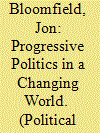

|
|
|
|
|
| Summary/Abstract |
if you are contesting a political argument, there are three broad routes you can follow. Either you engage with the case your opponent has outlined; or you can caricature the arguments; or you can attack the author. Sadly, Matthew Goodwin and Eric Kaufmann have combined the latter two options in their riposte to my piece on the fallacies of Blue Labour.
|
|
|
|
|
|
|
|
|
|
|
|
|
|
|
|
|
|
|
|
|